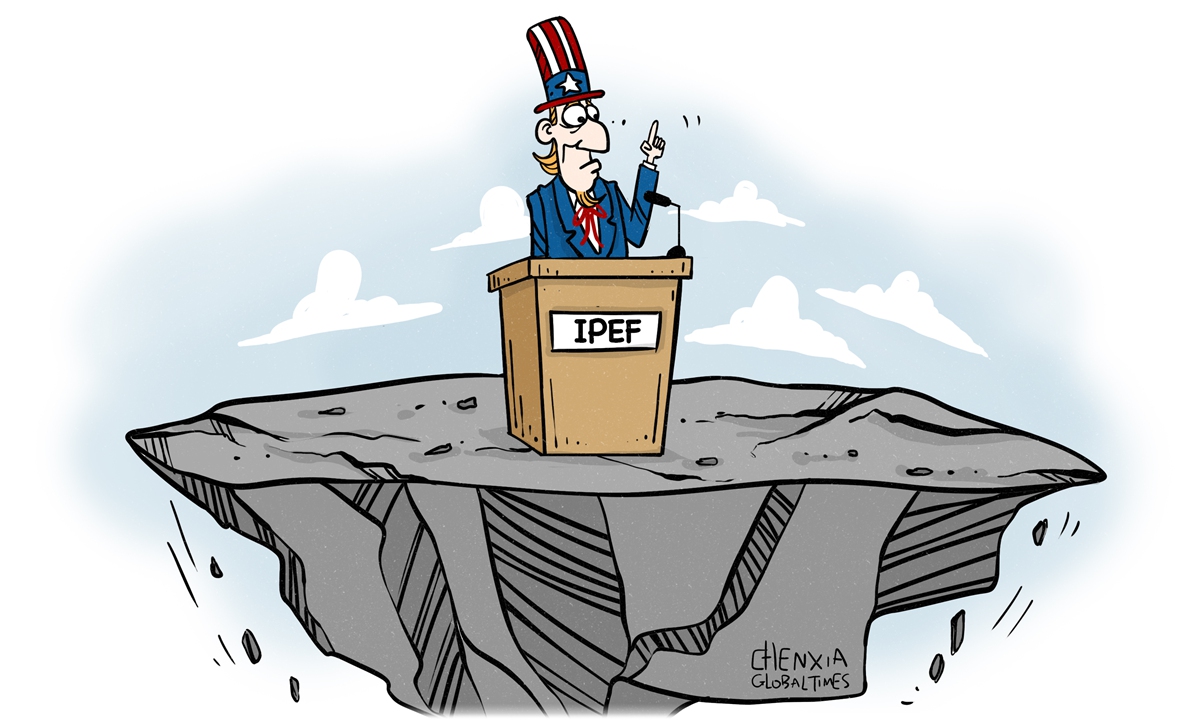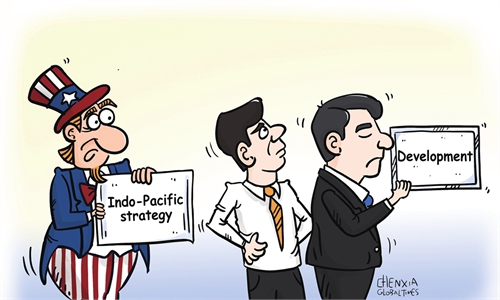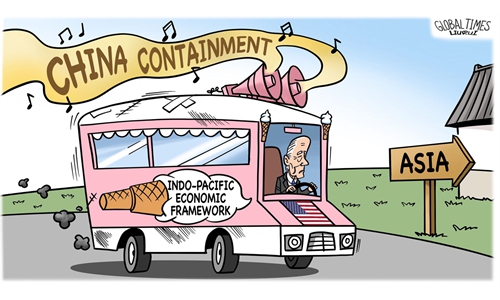
Illustration: Chen Xia/Global Times
Ministers from 14 member countries of the US-led Indo-Pacific Economic Framework for Prosperity, known as the IPEF, are reportedly set to have their first in-person gathering on Thursday and Friday in Los Angeles, marking the start of the so-called rules-making negotiations for the framework, which was launched in May and is widely seen as a Washington-created geopolitical tool to contain China.The meeting may touch on negotiations on issues like trade, supply chain and clean energy, and may lay out the first contours of an agreement, but many observers are not optimistic about the prospect of the talks, as the US is expected to have irreconcilable major differences with regional economies on issues like market access, tariff reduction, and trade liberalization. For similar reasons, former US President Donald Trump opted to withdraw from the Trans-Pacific Partnership Agreement(TPP) in 2017.
It is reported that IPEF is not a conventional trade agreement like TPP and it will mainly focus on the digital economy, semiconductors and other strategic materials, and promotes "high standards," but no matter how dazzling US rhetoric may be, it is almost certain that the US is not willing to make substantive concessions on any economic and trade issues of concern to other IPEF economies. The US always put its own interests first.
For instance, although South Korea joined the IPEF as an initial member in May, South Korean companies have felt betrayed after US President Biden signed the Inflation Reduction Act into law in August. South Korean electric vehicle makers are expected to take a severe hit as the US Inflation Reduction Act provides a tax rebate of up to $7,500 per electric vehicle in order to bring assembly lines and jobs back to the US.
US government officials have claimed that there are four policy pillars for IPEF - fair trade, supply chain resilience, infrastructure and clean energy. However, despite countless infrastructure plans conceived by the US, most of its promises have turned out to be only window dressing and don't involve any real investment. Similarly, the lack of support behind the opening of the US market behind IPEF is a fact that cannot be changed no matter how many ministerial meetings are to be held or how loud US officials tout their latest deal.
Rational people in many Asia-Pacific regional economies are increasingly aware of these facts, with some warning that it is best not to be too optimistic about the IPEF. Regional economies and the US may have considerable disagreements over many issues. The framework only touts the so-called "high standards," which poses challenges rather than providing benefits to regional economies.
For the US, from the TPP to the IPEF, what remains unchanged is that the Washington' purpose is by no means to promote economic and trade cooperation, and boost regional prosperity. Washington aspires to make use of the arrangements as tools to serve the US' own geopolitical agenda.
If regional countries are too focused on Washington's promises of promoting economic and trade cooperation, they are likely to be disappointed by IPEF talks. As a matter of fact, the gimmick of the IPEF is that Washington aims to divide regional cooperation, create more instability and undermine prosperity.
The US is attempting to use IPEF to woo other regional economies to "decouple" from China's economy and create a "small circle" that excludes China from regional supply chains.
However, the development of the Asia-Pacific cannot be achieved without participation of China. As China unwaveringly expands opening-up, countries in the region will form closer industrial chain links and economic and trade relations with China. Therefore, regardless of what to unfold of IPEF, regional economies should at least have the strategic determination not to fall into a trap dug by the shrewd politicians in Washington.
A so-called "Indo-Pacific Economic Framework" that excludes China would not make sense. In this regard, China has sufficient strategic determination. China will resolutely and vigorously promote economic cooperation in the Asia-Pacific region and through the RCEP cooperation framework, and will firmly improve economic and trade cooperation with all regional economies including India. China will continue to play a role in truly promoting win-win development throughout the Asia-Pacific region.
The author is a reporter with the Global Times. bizopinion@globaltimes.com.cn



